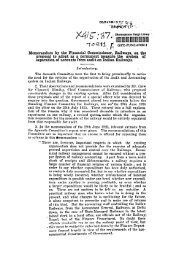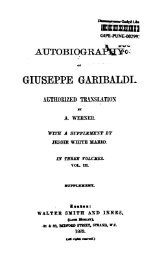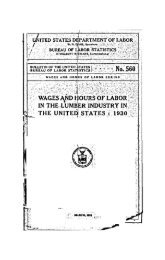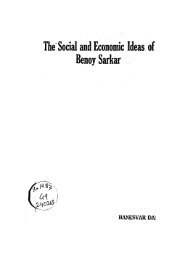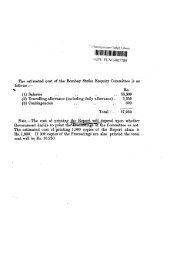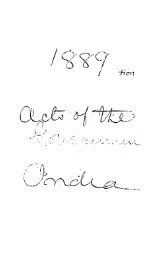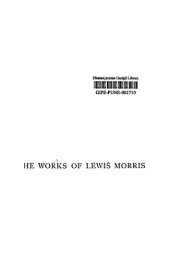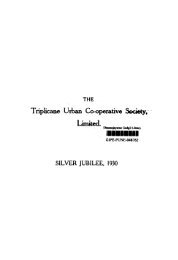You also want an ePaper? Increase the reach of your titles
YUMPU automatically turns print PDFs into web optimized ePapers that Google loves.
August 14th, J925 INDIAN OPINION 203<br />
NOTES AND NEWS<br />
T is difficult to foresee what fate awaits India.<br />
IT<br />
At a time when proper guidance is most essential<br />
to the youth of India in her struggle<br />
for freedom veterans, one after another, are speedily<br />
passing away. Within the short space of ten years<br />
we have recorded the deaths of not less than five<br />
great leaders, namely, Gokhale, Tilak, Sir Subramania<br />
Aiyar, Ashutosh Mukherjee and Das, and now<br />
we receive the sad news of the death of Sir<br />
Surendranath Dannerjea. It is an nndoubted fact<br />
that the present awakening of National spirit<br />
in India is the fmit of tt e labonrs of tht'se<br />
leaders who have not had the good fortune of seeing<br />
with their own eyes the accomplishment of their<br />
self-imposed task but have departed leaving the task<br />
to be accomplished by others. Let us hope that they<br />
will be guided by the same spirit that has guided<br />
the palt leaders. It is an irony of fate that<br />
Bengal should lose within a very short period three<br />
of her great men, for, the last three mentioned all<br />
belonged to Bengal. Bengal has evt'r stood first anti.<br />
even to-day stands first in her patriotism and this<br />
loss to her will be nnbearable. Sir Surt'ndranath<br />
leaves behind him one son and five danghters to<br />
whom and to Bengal we extend our heartfelt<br />
sympathy.<br />
With this issue we present our readers with a<br />
photo supplement of the late Sir Surendranath<br />
Baunerjea whose life sketch appears in another<br />
colnmn.<br />
Mr. Jogodish Chandra Mnkherjee the managing<br />
partner of the well-known firm of Calcutta-Messrs.<br />
Kamalalaya, (Wholesale and Export Clothiers, Hatters<br />
and Outfitters), who has recently come on a business<br />
trip to, the Union has arrived at Durban last Wednesday<br />
from Johannesburg and is the guest of Mr.<br />
Sorabjee Rustomjee. The firm represented by Mr.<br />
Mukherjee is perhaps the ouly Indian firm which<br />
is doing business on a large scale with many of the<br />
South African Europl'an firms. Mr. Mukherjee is. to<br />
our knowledge, the first Bengalee gentleman that has<br />
ever visited th~se shores. Although his mission is<br />
purely a business one he will, no doubt, incidentally<br />
have the opportunity of gaining a first-hand knowledge<br />
of the Indian question, of which, from the little<br />
chat we were able to have with him, Mr. Mukherjee<br />
seems to have already had some bitter experience.<br />
Mr. Mnkherjee sails for India by the<br />
8.8. Kar(lgola on the 17th instant.<br />
A petition with about a thou-aud .,ignatures has heen submitted<br />
to His Exalted HighneilS the Nizam, Hydrabad, for<br />
J!'ranting political reforms as embodied in a Memorandum<br />
prepared by the State Reforms Association sometime ago.<br />
The vreVIOUS memorandum from the State Reforms<br />
AlSOCiatlon prayed tho Nizam to gran~ representation in<br />
the Legislative Conncil in proportion to the percentage<br />
cf classes in the State with protection of minorities. The<br />
Nizam had previously announced in a declaration that the<br />
Legisilltive CounCIl should be coustituted aud enlarged<br />
on modern lines and it was in pursuance aud conformity<br />
with the principles of this declaration that the Htate<br />
Reforms Association put in their memorandnm.<br />
Mr. R. Srinivasau, M.L.C., reprel!enting the interests<br />
of the submerged classefl in the Legislature, has made his<br />
mark as a Social Worker. He was made Rao Sahab in<br />
tim last Honours' List, on the birthd8Y of H. I. M. the<br />
King. Mr. Srinivasan, it will be remembered, returned<br />
to India after completing a foIl term in civil service<br />
in South Africa and his many local friends will be<br />
pleued to learn of t.be \Ietvi~1!I he is tendering "- ~he<br />
lIotherl,udj<br />
Que;tions have been p~1; in connection with Mabatma<br />
Gandbl as to who pays h18 expenses and whether he is<br />
expensive? Mahatma Gandhi him\lelf answers these<br />
qUE'BtioDs in Young India :-<br />
"I do make the claim, that I attempt to act<br />
as I preach. Bot I must confess that I am not as inexpensive<br />
in my wants, 8S I would like to be. My food<br />
since my illneBB costs more than it should. By no means<br />
can I caU it a poor man's food. My travels too cost<br />
more than they did before my illness. I am no longer<br />
Ilble to travel long distance third class. Nor do I travel.<br />
all I did before. withou~ a companion. All this means<br />
not simplicity and povt'rty, bot the reverse of it. I draw<br />
nothlDg from the A.I.C.C. or the Gojarat Committee.<br />
But friends find Illy travelling expenses including food<br />
and clothing. Often during my tours railway tickets are<br />
purchased by those .who invite me and my host everywhere<br />
covers me with kind attention.<br />
THE ASIATIC BILL<br />
~ HE Areas Reservation and Immigration and<br />
II Registration (Further Provision) Bill, introduced<br />
hy the Minister of the Interior in<br />
the Union House of Assemhly at the close of the<br />
session reveals the Asiatic policy of the Government.<br />
There are two important chapters, the first<br />
dealing with the reservation of class areas and the<br />
second with amendments to the Immigrants Regulation<br />
Act. Chapters III. and IV. deal with<br />
amendm('nts to the Asiatics Rf'gistration Amendment<br />
Act of the Transvaal and the repeal wholly<br />
or in part of certain laws affecting Asiatics in<br />
Natal, Transvaal and the Cape Provincf.'.<br />
Fortunately the Government have launc]led this<br />
Bill at the close of Parliament. the object being,<br />
as stated by the Minister, to enable all concerned<br />
to study the measure. 'Ve are of opinion<br />
that the Government anticipate strClng opposition<br />
on the part of the British and Indian Governments.<br />
and thought it the best policy to allow the storm<br />
to gather and hurst before the Bill is proceeded<br />
with. Be that as it may, the time that must eJapqe<br />
before the Bill can be brought before Parliament.<br />
can be made use of by the Indian commllDity,<br />
both in India and South Africa, to enliRhten the<br />
mass of the people to its provisions. That is the<br />
first step. This complicated Bill must be examined<br />
thoroughly, and in order to assist our readers<br />
we publish in this issue the amendments to the<br />
Immigrants Regulation Act side by side with the<br />
original dauses. Later on we intend to examine<br />
each clause as amended and endeavour to show<br />
what effect such amendments will have npon the<br />
rights of Asiatic residents and their descendants.<br />
The first chapter, dealing with the reservation<br />
of class areas. affects adversely Asiatics only, although<br />
they are scarcely mentioned by name<br />
Cape Malays anti half-caste races such as the<br />
.. Cape Coloured," .. Mauritius Creole" and .. St.<br />
Helena persons" are exempt from the provisioM<br />
of this Bill. There is, of course, a political reason<br />
for exempting thec;e people. They have the Parliamentary<br />
franchise and can make their voice<br />
heard. Moreover there is a growing tendency to<br />
absorb certain Europeanised coloured people into<br />
the Buropean community, as the trend of recent<br />
legtalation dealin4 with wa~ and conditions in



